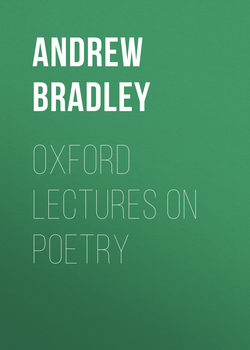Oxford Lectures on Poetry

Реклама. ООО «ЛитРес», ИНН: 7719571260.
Оглавление
Andrew Bradley. Oxford Lectures on Poetry
PREFACE
NOTE TO THE SECOND EDITION
POETRY FOR POETRY’S SAKE1
THE SUBLIME14
HEGEL’S THEORY OF TRAGEDY29
WORDSWORTH38
SHELLEY’S VIEW OF POETRY
THE LONG POEM IN THE AGE OF WORDSWORTH65
THE LETTERS OF KEATS
THE REJECTION OF FALSTAFF112
SHAKESPEARE’S ANTONY AND CLEOPATRA121
SHAKESPEARE THE MAN
SHAKESPEARE’S THEATRE AND AUDIENCE
Отрывок из книги
This edition is substantially identical with the first; but it and its later impressions contain a few improvements in points of detail, and, thanks to criticisms by my brother, F. H. Bradley, I hope to have made my meaning clearer in some pages of the second lecture.
There was an oversight in the first edition which I regret. In adding the note on p. 247 I forgot that I had not referred to Professor Dowden in the lecture on “Shakespeare the Man.” In everything that I have written on Shakespeare I am indebted to Professor Dowden, and certainly not least in that lecture.
.....
In pure poetry it is otherwise. Pure poetry is not the decoration of a preconceived and clearly defined matter: it springs from the creative impulse of a vague imaginative mass pressing for development and definition. If the poet already knew exactly what he meant to say, why should he write the poem? The poem would in fact already be written. For only its completion can reveal, even to him, exactly what he wanted. When he began and while he was at work, he did not possess his meaning; it possessed him. It was not a fully formed soul asking for a body: it was an inchoate soul in the inchoate body of perhaps two or three vague ideas and a few scattered phrases. The growing of this body into its full stature and perfect shape was the same thing as the gradual self-definition of the meaning.9 And this is the reason why such poems strike us as creations, not manufactures, and have the magical effect which mere decoration cannot produce. This is also the reason why, if we insist on asking for the meaning of such a poem, we can only be answered ‘It means itself.’
And so at last I may explain why I have troubled myself and you with what may seem an arid controversy about mere words. It is not so. These heresies which would make poetry a compound of two factors – a matter common to it with the merest prose, plus a poetic form, as the one heresy says: a poetical substance plus a negligible form, as the other says – are not only untrue, they are injurious to the dignity of poetry. In an age already inclined to shrink from those higher realms where poetry touches religion and philosophy, the formalist heresy encourages men to taste poetry as they would a fine wine, which has indeed an aesthetic value, but a small one. And then the natural man, finding an empty form, hurls into it the matter of cheap pathos, rancid sentiment, vulgar humour, bare lust, ravenous vanity – everything which, in Schiller’s phrase,10 the form should extirpate, but which no mere form can extirpate. And the other heresy – which is indeed rather a practice than a creed – encourages us in the habit so dear to us of putting our own thoughts or fancies into the place of the poet’s creation. What he meant by Hamlet, or the Ode to a Nightingale, or Abt Vogler, we say, is this or that which we knew already; and so we lose what he had to tell us. But he meant what he said, and said what he meant.
.....